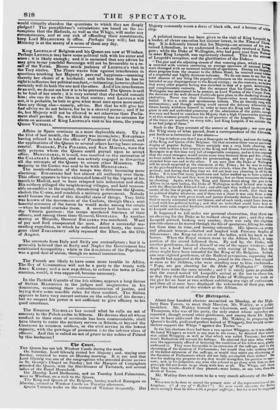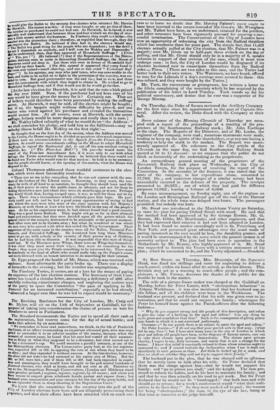erbe ibletropoito.
About four hundred electors assembled on Monday, at the High. bury Barn Tavern, to meet their Member, Mr. Wukley, at a public breakfast. Mr. Wakley himself was Chairman, and, except Colonel Thompson, who was of the party, the only orator whose speeches are reported ; though several other gentlemen, and among them Dr. Epps, seem to have addressed the company. Mr. Wakley, in proposing the Queen's health, professed perfect hatred of Whiggery, but would never- theless support the Whigs "against the Tories "- In the late elections there had been a run against Whiggery, as it WR9 He hated Whiggery as much as any man in the room ; he detested that which was called Wttiggery, as well as that which was called Toryism ; but every man's Radicalism did not suit his feelings. Ile admired that man who, when- ever the opportunity offered of bettering the condition of his fellow men, gladly embraced it. They were favourable to an extension of the suffrage, and to the shortening of the duration of' Parliaments; but would they take nothing short of the fullest extension of the suffrage, or would they reject any shortening of the duration of Parliaments which did not fully accomplish their wishes? Ha Was for making any progress to-day that would strengthen his position to-mar• row; and, in his judgment, any man who refused to go along with him on tint priLeiple did not desire to go along with hint at all. The Whigs, call them what they would—devils if they pleased—were better, at any rate, than the devils of Tories. Mr. Wakley does not seem to be a very stanch advocate of the Bal- lot— What was to he done to amend the present state of the representation of the kingdom. (" A cry of " Bollot I ") No man could advocate the Ballot more strongly than he dal—with a proper suffrage; but let it not be supposad se would give the Ballot to the seventy-five electors who returned Mr. Herries sir Harwich. His reason was this : if they were bought, or any poi tion of them, the number so purchased he could not find out. At Harwich, he believed, it was tolerably well understood that between three and four o'clock on the day of elec- tion a little money settled the business. In Finsbury they could not bribe—the
r was the protection there ; therefore, as regarded that borough, they did "sstinrbeequire the Ballot. He believed if they had it, the electors would say,
fire Ballot is a good thing for the people who are dependent' but the devil a it am I dependent on anybody, and I will vote for Wakley and Dancombe." gid he understend, then, that they approved of Household Suffrage ? ( Cries Yes yes F") He believed (?) that if the Representatives ot the Metro- ;titan districts were to unite in demanding Household Suffrage, the House of commons could not deny it. Let those who were in favour of Hcusehold Sur- *see hold up their bandit. ( On this appeal it appeared that every hand in site room was raised—much cheering, and one or two cried " Universal Suf. ") In his opinion, any man who paid taxes, who was answerable to the Imo, and liable to be called on to fight in the protection of the country, was en- titled to vote. But good government was the end they had in vitw, and these were the instruments with which they hoped to obtain it. He wished to go to Household Suffrage first, and if that would not do he would go further. [At the late election for Harwich, it is said that the vote which gained She day cost 10001. Now, if the purchaser had not been sure of his Tote would he have given the money for it? Certainly not. That act of bribery would therefore have been prevented by making the suffrage secret. At Harwich, it may be said, all the electors might be bought ; but if so, the bargain might without difficulty be proved, and one traitor who voted against his purchaser and revealed the transaction would unseat him. ..At all events, even at Harwich, with the secret suffrage, bribery would be more dangeous and costly than it is now.'
Mr. Wakley talked valiantly of what he would do on" the Address : " we shall remember his pledge, and hold him to the fulfilment—may no aolucky illness befall Mr. Wakley on the first night !-
lie thought that on the first day of the session, when the Address was moved to the Crown, the House ought to be divided on questions of so much importance. if there were no recommendation ion the Speech from the Crown as to these Natters, he would mace amendments calling on the House to adopt Household Suffrage, to repeal the Septennial Act, to cut off the non-resident voting in aunties' Inc. (" The Poor-law Bill! ") Oh yes—he would move the repeal of the Poor-law Amendment Act, if it were only to see with what Jeeliogq the Tories entertained the motion : he believed that there would not is found ten Tories who would vote for that motion : he held it to be necessary that the people should know, at the opening of the session, what the House was disposed to do.
Colonel Thompson addressed these truthfnl sentences to the elec- tors, which were most favourably received-
" There was no use in his concealing that he was not content with the con- duct of the leaders of the Liberal cause. Knowing, as they must, the ten- deity for evils of all kind to accumulate, he thought they should have used the day of their power to carry the public cause in advance, and not let them be finding themselves now just where they were six months ago, or worse. Perhaps they would think that, having escaped once, it was as well for them not to try again. There was a circumstance which certainly gave him hope. He posi- tively could not tell, and he had a good many opportunities of trying to find set, where the men were who were of the same opinion with her Majesty's Ministers, or with those at least who were the blocks in the way of the people's muse. As far as his experience went, he had always found that a good country Whig was a good town Radical. They might not go so far in their ultimate ispea and expectations, but they were decided upon all the points which the gmeral voice of the country determined to be attainable at the present moment. each allies were not to be thrown away; hut what he wondered at was where the men were who agreed with what was called the Whig Government. Their supporters of the same name in the country were all for Ballot, Triennial Par- liaments, and Extended Suffrage. He wondered how long these Ministers meant to go on, with nobody in the country of their precise way of thinking, that he had been able to discover. It was impossible that this state of things could last. If the Ministers were Whigs, there were no Whigs but themselves. It was dear they must mend their ways ; they must do something for the People ; they nmst give the People something to be interested for. There must he somebody at the head of affairs who would really take up the People's cause, and move forward with an honest intention to do something for their interest.
Dr. Epps proposed the health of Mr. Hume, which was received with applause. Soon afterwards the party broke up. There was a display of fireworks in the evening; but the weather was unpropitious.
The Finsbury Tories, it seems, are at a loss for the means of paying the expenses of the late election contest. The Secretary of their Com- mittee has issued a circular letter, announcing a deficiency of 500/, after carefully reducing extortionate charges, and imploring the zealous men ef the party to spare the Committee "the pain of applying to Mr. Pereeval for an increased contribution," especially as he had already "advanced a larger sum than he was led to expect would be necessary."



























 Previous page
Previous page